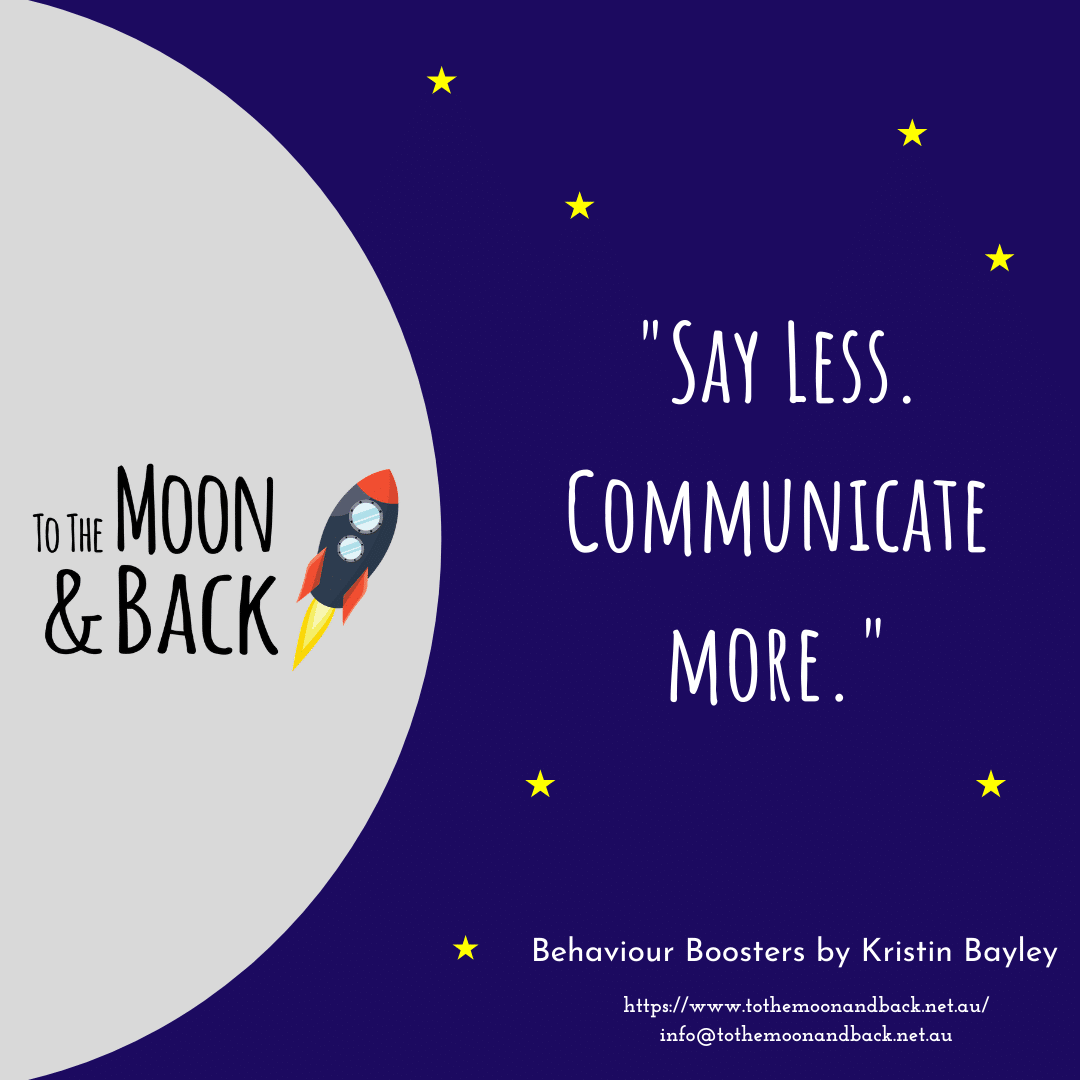
07 Jan Say Less. Communicate More.
Say Less and Communicate More – Strategies for Challenging Behaviour
It always starts the same way. Kids are happily playing: Mr 7 with Lego, Miss 10 reading. I decide I might try to get something done. Make a phone call. Wipe a table. Fold laundry. Send an email. Maybe even all the above. The thought makes me giddy.
Mr 7 senses weakness. He lies in wait until I am almost-but-not-quite-fully-immersed in my task.
“Muuuuuuuummmmmmmmmm! I”m bored.”
“Oh, for goodness sake,” I think. But, no, I will not give in to this. So, I pretend as if I didn’t hear him. Back to task. It will take five minutes, then we can play a game.
“Muuuummmmm. Mummumumumumumumumumumum! There’s nothing to do!”
“Lalalalalalalala,” I think, mentally placing my fingers in my ears. Three minutes of peace ensues. I should have been suspicious. It wasn’t going to end.
The next sound I hear is the sound of Miss 10 shrieking, “You ruined it! I hate you. Go away!”
Sigh. Yup, can’t ignore that. I push back from the table and head upstairs. Mr 7 is standing outside Miss 10”s bedroom, working hard at maintaining his innocent face. Miss 10 is standing just inside her bedroom in tears.
“What is going on?” I speak loudly, though, I”m proud to report, not shouting. I am looking at Mr. 7.
“I didn”t do anything,” he says. “I was just…”
“He ruined my draaaawwwwiiiiiiing!!!!!!!” Miss 10 holds up a (now ripped) drawing of a horse she had been working on.
“I didn’t…It was on the floor and I accidentally stepped…”.
I interrupt him. “Why were you even in your sister’s room?” Seething.
“Well, there was nothing to do…”
“Why do I constantly have to have this conversation with you? Why can’t you just entertain yourself for five minutes while I do something. You have a room full of lego.” To illustrate, I emphatically push open the door to the neighbouring play room which is indeed full of lego. “And books! You have books to read!” I am now shouting. I have lost my cool.
Mr 7 takes his cue. “But I really wanted to play with someone.” His lower lip trembles a bit. Full puppy dog eyes.
Game, set, match.
“Ok, bud,” I sigh, knowing I’m never going to tick my to-do list off anyway, “Let’s go play Cluedo.”
This is a story that plays out more often that I would like in my house. Once the wave of mother guilt resides, I can’t help but feel that I should have known better. I have two Master’s degrees. One is in analysing human behaviour. The other is in human communication. I have worked with hundreds of children with behaviour challenges over 20 years. How does parenting have me so tangled and twisted, questioning my every move? Each time the episode winds to its conclusion, I am left feeling empty and a bit of a failure.
Oh, and not to mention the gut-wrenching guilt. Miss 10 feels she’s lost out and life is SO unfair (and I see her point- he did wreck her drawing), and Mr 7, well, I suspect there is a degree of self-satisfaction. He won the “Get mum’s attention game” fair and square, though he won it by doing the wrong things. I’m left to wonder, “What has he learned?” Answer: “Not the right thing.”
Wouldn’t we all be better off if things happened differently?
Here’s the thing. Attention is attention. Being told well done, being given a cuddle, or being told off. There is no rule in the How to Be a Kid Handbook that says “Thou shalt act contrite if your parent tells you off.” None, I checked. Case in point: Miss 10 would fall in a heap and be apologising for three days if I commented on the wonky way she put a dish in the dishwasher (so much like her mother!). On the other hand, Mr 7 is impervious, almost disdainful if we suggest he probably shouldn’t do a headstand inches from the dentist whilst the dentist is, oh yeah, prodding his sisters mouth with sharp implements (Yes, this is my life).
This brings about a parenting Catch-22. Mr 7 requires the most, ahem, parental guidance when it comes to making good choices, and yet, is the most difficult to get through to. So, what do I do? Shout louder? More creative “punishments”, loss of privileges, no iPad till he”s 42? Sure, ruling with an iron fist is one option, but where does it end?
Here’s where it gets controversial. Clearly telling off wasn’t working. So why did I need to do it? This is no rule in the How to Be a Parent Handbook that says “Thou shalt tell off child for bad behaviour”. This was simply something I felt like I needed to do. On the playground, it shows that we are responsible, not neglectful parents. Saying that we are “shocked and appalled” by our child’s behaviour shows that it’s not something that happens all the time. We are good parents. At home, it’s the default. You are frustrated/angry/scared, and so you let your child know. But if it doesn’t achieve an end, why are you doing it?
But what to do instead? My training tells me that if attention is what is positively reinforcing the behaviour, then we need to remove the attention. Hmmm, there’s an interesting thought. It also suggests that Mr 7 has an underlying need for attention that is being unmet.
I hop in my mental time travel machine to apply this logic to the episode that just unfolded. Would the story have played out differently if I had raced upstairs and directed my attention to Miss 10? What if I had comforted her, and cuddled her and taken her downstairs to play a game of Cluedo. Left Mr 7 out in the cold.
Let’s take that logic a bit further. If attention is what he wanted, what if I had given it to him for the first instance of “requesting” for attention. What if, at the first sign of impending boredom, I encouraged Mr 7 to ask appropriately to play a game with me, and then responded to that request with enthusiasm and my undivided attention over a game of Cluedo? What if, instead of putting him off indefinitely, I had given him a clear limit – “Give me 5 minutes to wipe this table/fold this laundry/make this phone call, and then we’ll play Cluedo.” And then, importantly, I followed through with my promise.
It’s not easy though, is it? When we get those precious opportunities as parents to catch up on the chore list, it’s hard to turn away. Sometimes, we don’t see the opportunity to nip a behaviour “challenge” in the bud until it’s too late and we have a thrashing meltdown on our hands.
Despite my training and experience, I get it wrong, really wrong, more often than I’d like to admit. That’s ok. It really is. We all do the best we can do at the time. So much of parenting is reactive – responding in the moment to situations that get thrown your way. Some of it is mundane – spilt milk, ripped drawings. Some more perilous – chipped teeth, broken bones. We forget the importance of being proactive.
The really excellent thing about behaviours that challenge is that they do not occur in a vacuum. They rarely occur “for no reason”. They can be predicted and explored. It is possible to find strategies to prevent them. A plan helps you feel in control next time. It also helps your child to feel in control of the environment around them. That is a win-win situation for both of you and likely to result in a far better end to the story.
Want to know more about how applied behaviour analysis can help you to understand your child’s behaviour and identify strategies to address? Check our website at https://www.tothemoonandback.net.au or contact us to ask about our “Mission Control” parent training program.
Email: info@tothemoonandback.net.au
Phone: 0411 427 233


No Comments